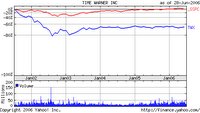
The Wall Street Journal ran another piece about TimeWarner's woes last Friday. I wrote about TWX recently here. The chart at the left displays the firm's performance, relative to the S&P500, over the last five years.
Rather than repeat what I wrote there, which is pretty recent, I'd like to use the continuing coverage of TimeWarner's troubles to discuss a root cause of the trouble. That cause is a confusion among senior management of growth and size.
Here's a quick primer. Growth prospects have and create value based upon their own performance. Adding or retaining growth prospects among a collection of non-growth units will hide the value created by the growth prospects. Being a large company is no longer value creating in and of itself, and certainly not in a fast-changing, technologically-affected sector like entertainment and communications.
Thus, Time Warner is now being run exactly wrong. It's a testament to a bygone age in which size conferred safety from takeovers. Dick Parsons points to a few units and assures investors that, any day now, TWX will pull out of its value-destroying tailspin.
The reality is this. In this day and age, small companies, like YouTube (to be covered in an imminent post) can create successfully, in a garage what large media companies cannot. Small startups can employ bright people, off-the-shelf technology and functional services (accounting, HR, sales, finance), get funding from VC's or other sources, and, ultimately, the market. In surprisingly short timeframes, they can commercialize and market products and services that a giant like Time Warner can only discuss and plan. If the latter could effectively implement the concept to begin with.
Time Warner is ailing because its many mediocre divisions, staffed by mediocre salaried employees, can't innovate and grow sufficiently to match competitors. The size of this congolmerate makes delivering excellent customer value at a profit a second-order issue, behind just "running the company."
According to the WSJ, TWX has lost 10% of it's market value since Icahn abandoned his attempt to get control of the board. Not surprising.
In such a dynamic sector as entertainment, why would anyone expect a large, multi-divisional dinosaur to create consistently-superior shareholder returns? The very size of TWX almost guarantees that some of their units will drag performance. Shareholders would be so much better off by a split of the firm into many pieces, each delivering superior value to consumers on its own, and earning consistently superior returns for its shareholders. The weak, lagging units would, necessarily, be dealt with as the market typically does- value destroyed, bought cheaply for restructuring, and removed as a burden on the better-performing growth prospects that are now hidden within Time Warner's vast collection of media businesses.
No comments:
Post a Comment